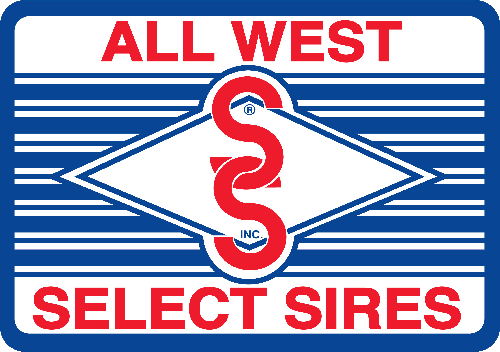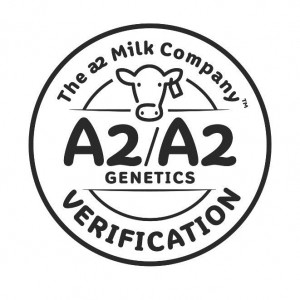Click Here to view available a2 sires from Select Sires
In April of 2015, a2 Milk Company made its debut in California retail outlets such as Safeway, Krogers and Whole Foods. Originally founded in New Zealand in 2000, the a2 Milk Company has trading activities in Australia, the UK, China and now the U.S. The company plans to invest $20 million over the next three years to fund its entry into the U.S. marketplace with sales beginning in California. The a2 Milk brand is initially planning to sell their milk in half gallon containers ranging from $4.00-$4.50.
As this New Zealand based company begins to grow globally, many consumers find themselves asking the question “what is it that makes A2 milk different from conventional milk?” The answer to this question lies directly in the science of milk’s composition and how it interacts with the human digestive tract.
The beta-casein proteins found in cow’s milk are made of a strand of 209 amino acids all linked together. The difference between A1 and A2 is simply just one amino acid. In A1 milk, amino acid number 67 is a histidine rather than a proline. Today most dairy cows produce a mixture of both A1 and A2 beta-casein protein which comprises up to 30% of milk solids. The A2 protein is widely recognized as being the original beta-casein in cows. However, about 10,000 years ago a natural single cell genetic mutation (A1 beta-casein) appeared in Europe and managed to spread globally throughout dairy herds over time. This discovery led to further research that began to highlight the true importance in the A1/A2 milk distinction.
Research out of Curtin University in Perth, Australia, supports previous animal studies that conclude there are differences between the way A1 and A2 milk affects the human body. Forty-one people who ordinarily experience varying levels of discomfort while drinking milk, took part in blind tests not knowing if they were drinking A1 or A2 milk. Those who drank A2 reported less bloating, less stomach upset, and firmer stools. More information about the results can be found in the European Journal of Clinical Nutrition (EJCN).
A2 milk is still a very new choice for consumers and producers in the U.S., but has great potential in the market. Since it was first introduced in Australia, a2 Milk has grown to supply 9.3% of the country’s total fluid milk.
The A2 gene can be selected for by choosing A2 dominant cows. Breeds that are commonly A2 dominant include; Jersey, Guernsey, Normande, and Brown Swiss. Animals can also be tested in existing herds by running a simple genomic test on their tail hair. Producers who have decided to test will segregate their A2 cows out and milk them separately, insuring that the “A2 only” milk is pure. Facilities such as UC Davis Veterinary Genetics Laboratory do A2 genomic testing and charge $25 per test, which requires 20-30 tail hairs.
Click Here to view available a2 sires from Select Sires
Producers in many different states across the U.S. are already actively switching their herds over to A2 milk production in anticipation of the future increase in consumer demand for higher quality milk. The transition to A2 only milk production is guided by using A2 dominant bulls and genomic testing. However small A2 Milk may currently be, who can really predict where it will go in the U.S. over the next few years?
For more information about a2 Milk Company and A2 certification check out www.thea2milkcompany.com


 .
. .
. .
. .
. .
. .
.